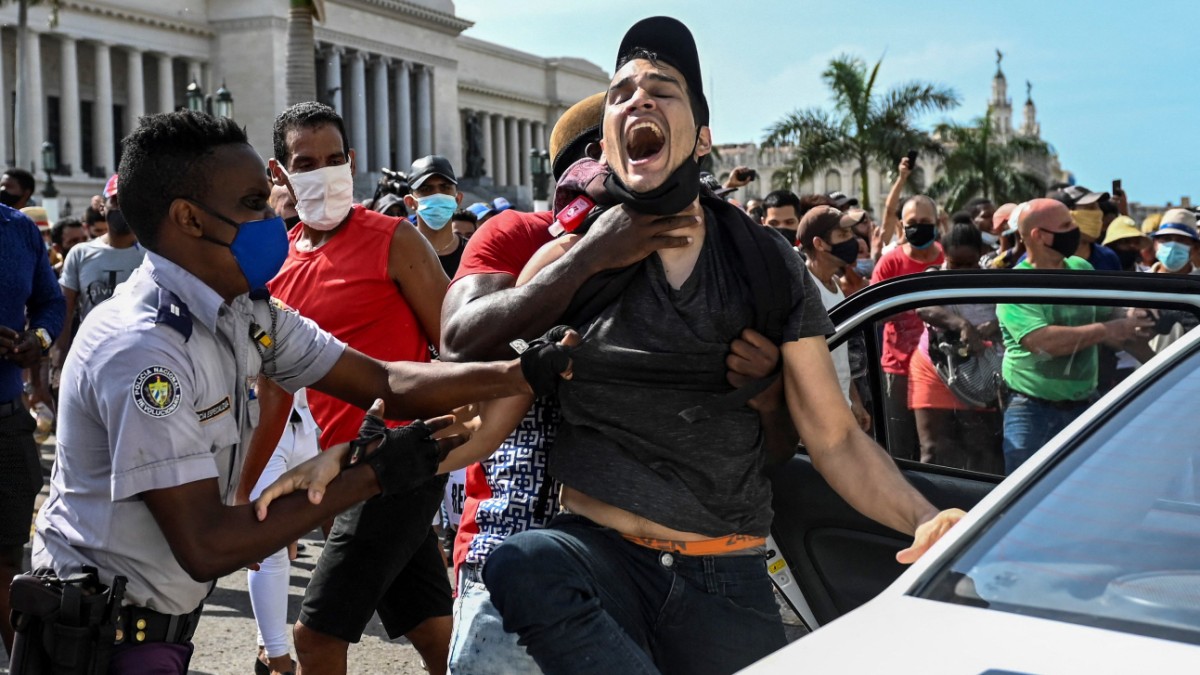US President Joe Biden took his time. Only on Monday did he comment on the protests in Cuba that had been going on for days. “We stand by the Cuban people and their clear call for freedom,” says his statement, which is just a few lines long. The Cubans are beaten by the pandemic and by an “authoritarian regime” that is suppressing its people and exposing them to economic suffering. Biden appealed to the Cuban government to listen to the people.
What Biden did not mention is that the US has played a significant part in the suffering of Cubans. The then President Barack Obama declared the sanctions against Cuba to be over in 2015. But his successor Donald Trump tightened this screw again. The sanctions Trump imposed on Cuba hit the people there directly. Any form of tourist travel to the Caribbean island is prohibited from the soil of the USA. If you want to go to Cuba, you have to look for flights, hotels, bus and train connections on your own – and have a good reason for your trip.
It is also almost impossible to transfer money to Cuba from the USA. The estimated 2.3 million Cubans in exile in the United States have considerable difficulty supporting families or friends in Cuba. In 2018, Cubans received a total of 6.6 billion US dollars from the United States. In the meantime, the transfers are no longer worth mentioning. If you can, fly over there with your pockets full of cash.
Since Biden took office, many Cubans have been hoping that the new US president will abolish the harsh sanctions imposed by the previous government. So far, however, there has been no movement in that direction. In March, White House spokeswoman Jen Psaki said Cuba was “not one of Biden’s top priorities at the moment.” When Raul Castro resigned as chairman of the Cuban Communist Party a month later, Psaki replied almost word for word: no priority.
Ned Price, the spokesman for the US State Department, pointed out on Monday that the US policy on Cuba was being revised. Which means nothing else than that Trump’s restrictive Cuban policy was simply continued under Biden. Incidentally, this also means that the US government continues to classify Cuba as a “supporter of terrorism”.
Biden’s line has so far also been supported by party friends
So far, Biden has had supporters in his own ranks for this line. The Democratic Senator Bob Menendez from New Jersey, chairman of the Senate Foreign Affairs Committee, says: The regime must understand that only internal change will lead to a change in sanctions policy. And not automatically a new presidency. It was therefore important that Biden did not touch the existing sanctions. In view of the protests, however, he was now in favor of seeing what could be done.
So it is not yet clear how the Biden government will react to the protests in Cuba. Domestically, this is a sensitive issue. If he relaxes sanctions, he is accused of stabilizing a communist system. For the Republicans, this would be a welcome argumentation aid in the upcoming election campaign for the congressional elections next year. If Biden doesn’t do anything, he abandons the Cubans.
So Biden is getting pressure from all sides. Also from the old Obama administration, of which he was Vice President. Ben Rhodes advised Obama on opening up to Cuba. Now he told the online magazine Politicothat it is easy to make demands on the Cuban government while doing nothing yourself. “I just don’t think that’s the approach that will be constructive here.”
Loosening sanctions will not be easy
That it cannot stay that way seems to have arrived in the Biden government. Spokeswoman Psaki said on Monday: “We are looking into how we can help the people in Cuba.”
It won’t be easy. Travel facilitation could be a means. The tourism companies in Cuba are controlled by the military, which is firmly in the hands of the Castro clan. Every overnight stay in a hotel ultimately helps the system. Another step would be to allow direct dollar transfers to Cuba again. However, even that is hardly possible without the Cuban regime cutting some of it off. In addition, only that small portion of the approximately eleven million Cubans who can fall back on stable and resilient international contacts would benefit from the transfers.
Some in the Biden government fear that the humanitarian crisis could turn into a migration crisis. At the beginning of the second half of the 20th century, and most recently after the great protests of 1994, the Cuban government let masses of critical “intelectuales” be drawn in to get some peace from the alleged counter-revolutionaries at home. Should Biden soon have to decide whether to let these people into the country, then his Cuba policy would probably not have worked.
.
Paul is a talented author and journalist with a passion for entertainment and general news. He currently works as a writer at the 247 News Agency, where he has established herself as a respected voice in the industry.











